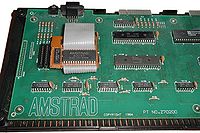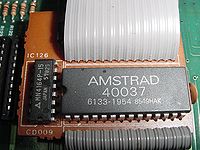Difference between revisions of "472"
From CPCWiki - THE Amstrad CPC encyclopedia!
m (To add some photos) |
|||
| Line 7: | Line 7: | ||
As there were no space for a new chip, Amstrad designers took off one of the ROM chips, and put it in a daughter board, along with the 4164 chip. Wires connected pins at the ROM from the daughter board to the corresponding pins on the main board. The wires were hard enough to make difficult to turn the daughter board over and reveal the trick: no wires were connected from the DRAM chip, to the main board. Even supply pins were not connected!! | As there were no space for a new chip, Amstrad designers took off one of the ROM chips, and put it in a daughter board, along with the 4164 chip. Wires connected pins at the ROM from the daughter board to the corresponding pins on the main board. The wires were hard enough to make difficult to turn the daughter board over and reveal the trick: no wires were connected from the DRAM chip, to the main board. Even supply pins were not connected!! | ||
| − | After the rule changed there was also a CPC 472 with non-spanish keys available for a very short time. The CPC 472 with spanish or british keyboard is very very rare. | + | After the rule changed there was also a CPC 472 with non-spanish keys available for a very short time. The CPC 472 with spanish or british keyboard is very very rare.[[Image:Amstrad 472 detail motherboard.jpg|thumb|right|200px|Motherboard close-up, showing the "8KB" extra memory, next to the 40037 ROM chip.]] |
[[Category:Hardware]] | [[Category:Hardware]] | ||
Revision as of 22:06, 18 October 2008
The CPC 472 was a spanish version of the CPC 464 with additional 8 KB RAM. The reason Amstrad released a special version for the spanish market was a law (RD 1250/1985) that said that every computer with up to 64kb should adhere to some rules - namely, have extra keys for the spanish language, and the video hardware had to be able to display spanish characters; otherwise an extra tax would be levied. So Amstrad soldered in an extra 8kb which was not, however, usable by the machine since it was not connected to anything else. Later on Amstrad released a 472 with a proper spanish keyboard and the 8 extra kB as well.The 8KB "extra" memory, was in fact a single 4164 DRAM chip. This chip stores 64 Kbits. Its data bus was only one bit. So, it weren't unable at all to use this chip to have 8 KBytes, as the Z80 needs memory to be 8 bits wide.
As there were no space for a new chip, Amstrad designers took off one of the ROM chips, and put it in a daughter board, along with the 4164 chip. Wires connected pins at the ROM from the daughter board to the corresponding pins on the main board. The wires were hard enough to make difficult to turn the daughter board over and reveal the trick: no wires were connected from the DRAM chip, to the main board. Even supply pins were not connected!!
After the rule changed there was also a CPC 472 with non-spanish keys available for a very short time. The CPC 472 with spanish or british keyboard is very very rare.

